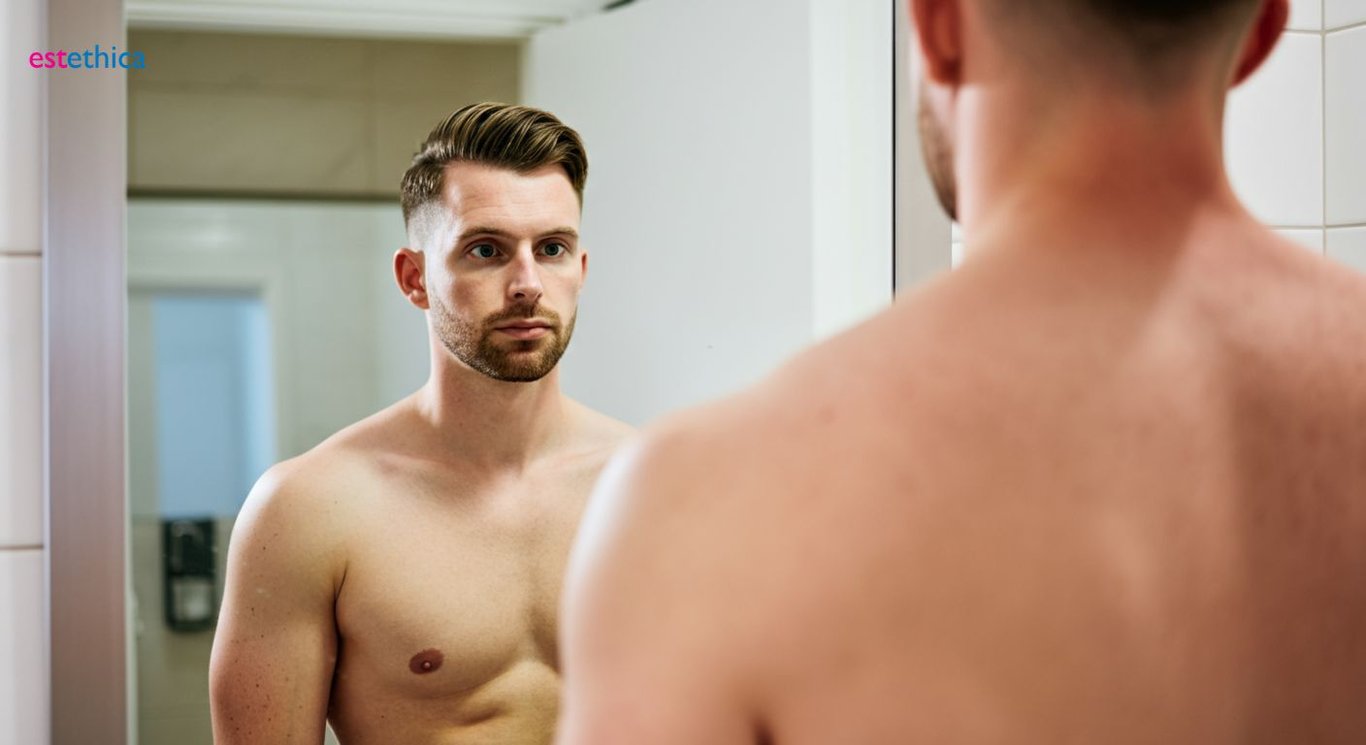Gynecomastia: Understand, Address, and Reclaim Your Confidence
Gynecomastia affects self-esteem. Discover effective treatments and reclaim your chest with confidence.
Gynecomastia, often casually referred to as "man boobs," is more than just a cosmetic issue. It affects psychological well-being, sometimes leading to social embarrassment and a loss of confidence. Understanding the roots of this condition, its psychological impacts, and the available treatments— from lifestyle changes to surgical intervention— can empower those affected to find solutions and regain their self-assuredness.
Unveiling Gynecomastia: What It Is and Why It Happens
Understanding the Multi-Faceted Causes of Gynecomastia
Gynecomastia, characterized by the enlargement of breast gland tissue in males, stems from a variety of hormonal imbalances. These imbalances often involve elevated estrogen, reduced testosterone, or irregularities in how the body regulates these hormones. While commonly associated with puberty, gynecomastia can also be triggered by various external and internal factors. For example, certain medications, such as anti-androgens, some AIDS medications, and even certain antidepressants, have been shown to contribute to this condition. Additionally, underlying health issues like obesity, tumors affecting hormone production, hyperthyroidism, and chronic liver disease can also play a significant role. Accurate diagnosis, often involving thorough testing, is crucial to differentiate gynecomastia from pseudogynecomastia, which is simply the accumulation of fat tissue in the chest area.
Distinguishing Gynecomastia from Similar Conditions
Differentiating gynecomastia from other conditions is essential for proper diagnosis and treatment. True gynecomastia involves the growth of glandular breast tissue, while pseudogynecomastia is characterized by increased fat accumulation in the chest area. Diagnostic tests, including hormone level assessments and imaging studies, help determine the underlying cause. For example, a physical exam combined with blood tests to measure hormone levels can often distinguish between hormonal imbalances and other potential causes. Gynecomastia can affect individuals differently, requiring tailored management strategies based on its origin and severity.
- Hormonal Imbalances: Elevated estrogen relative to testosterone leads to breast tissue growth.
- Medication Side Effects: Certain drugs can disrupt hormonal balance, causing gynecomastia.
- Underlying Health Issues: Conditions like liver disease or hyperthyroidism can trigger hormonal changes.
- Initial Assessment: Physical examination and patient history to identify potential causes.
- Hormone Evaluation: Blood tests to analyze estrogen, testosterone, and other relevant hormone levels.
- Imaging Studies: Mammograms or ultrasounds to differentiate glandular tissue from fat accumulation.

Beyond Man Boobs: Exploring the Psychological Impact of Gynecomastia
Addressing the Emotional and Psychological Toll of Gynecomastia
Beyond the physical manifestations, the emotional toll of gynecomastia can be profound. Affected individuals may grapple with self-esteem issues, body dysmorphic disorders, depression, anxiety, and social avoidance. The stigma attached to having enlarged male breasts often exacerbates emotional distress, highlighting the importance of addressing both the physical and psychological needs in treatment plans. For example, some men avoid activities like swimming or changing in public locker rooms. They might also experience difficulties in forming intimate relationships due to their body image concerns. Therapy and counseling can be integral parts of a comprehensive approach, helping patients navigate these emotional challenges and build resilience. It is imperative that treatment strategies are holistic, acknowledging and attempting to alleviate the psychological burdens associated with gynecomastia, in addition to the physical aspects.
Coping Strategies for Body Image and Self-Esteem Concerns
Gynecomastia can significantly impact a person's body image and self-esteem, leading to emotional and psychological distress. Developing effective coping strategies is essential for managing these challenges. Cognitive behavioral therapy (CBT) is one approach that can help individuals reframe negative thoughts and beliefs about their bodies. Support groups, where people can share experiences and coping mechanisms, can also be invaluable. Additionally, engaging in activities that promote self-care and improve overall well-being, such as exercise, mindfulness, and creative outlets, can boost self-esteem. It is important for individuals with gynecomastia to adopt a positive self-image and to focus on their strengths and positive qualities. Remember to reach out to mental health professionals who can offer personalized strategies to address these emotional struggles associated with gynecomastia, ensuring a more complete healing process.
- Cognitive Restructuring: Challenging and reframing negative thoughts about body image.
- Support Groups: Sharing experiences with others to reduce feelings of isolation.
- Self-Care Activities: Promoting overall well-being to boost self-esteem.
- Seeking Professional Help: Consulting therapists or counselors for guidance.
- Building a Support Network: Connecting with friends and family for emotional support.
- Developing Positive Coping Mechanisms: Identifying healthy strategies to manage emotional distress.

From Diet to Surgery: Exploring Gynecomastia Treatment Choices
Lifestyle Adjustments as the First Step in Gynecomastia Management
Often, addressing gynecomastia begins with basic lifestyle modifications. For many individuals, particularly those experiencing pseudogynecomastia, losing weight and building muscle can significantly reduce the chest's appearance. A balanced diet combined with regular exercise helps to decrease overall body fat, which in turn diminishes the fatty tissue around the breasts. Strength training exercises, such as chest presses and push-ups, can enhance muscle tone, creating a firmer, more defined chest. In fact, some studies suggest that combining aerobic exercise with resistance training leads to a noticeable reduction in chest fat for overweight individuals. Even simple changes like walking and adopting a protein-rich diet can make marked improvements.
Medical and Surgical Interventions for Persistent Gynecomastia
When lifestyle changes are not enough, medical and surgical options provide additional solutions for those facing persistent gynecomastia. Medical treatments often involve hormone regulation, using medications to balance estrogen and testosterone levels. Surgical interventions, such as liposuction or surgical excision, can remove excess fat and glandular tissue for a flatter, more masculine chest. For instance, selective estrogen receptor modulators (SERMs) like tamoxifen are sometimes prescribed to block estrogen's effects on breast tissue. On the surgical front, liposuction targets fatty tissue, while surgical excision removes both fat and glandular tissue, thus providing more comprehensive results in severe cases. Combining both medical and surgical approaches might be necessary for optimal results, tailored to individual needs and severity of the condition.
- Hormone Regulation: Medications to balance estrogen and testosterone.
- Liposuction: Removal of excess fat tissue from the chest.
- Surgical Excision: Removal of both fat and glandular tissue.
- Initial Consultation: Assessment of the condition and discussion of treatment goals.
- Medical Evaluation: Blood tests and physical exams to determine underlying causes.
- Treatment Plan: Customized approach combining lifestyle changes, medication, or surgery.

Male Breast Reduction: Procedures for a More Sculpted Chest
Surgical Techniques for Achieving a Natural Chest Contour
At estethica, professionals employ advanced surgical techniques designed specifically for male breast reduction, ensuring results that are both effective and aesthetically pleasing. These procedures primarily involve two key methods: liposuction and tissue excision. Liposuction is particularly effective for addressing excess fat in the chest area, using minimally invasive techniques to remove unwanted fat deposits. Tissue excision, on the other hand, is crucial for removing excess glandular tissue, which often contributes to the appearance of gynecomastia. Depending on the individual's specific condition, a combination of both liposuction and tissue excision may be used to achieve optimal results. Skilled surgeons at estethica tailor each procedure to meet the unique needs of the patient, ensuring a natural and masculine chest contour. For instance, a young man with excess chest fat may benefit from liposuction alone, while an older individual with significant glandular growth may require tissue excision for optimal correction.
Recovery and Long-Term Maintenance After Male Breast Reduction
The recovery process following male breast reduction is a crucial phase that impacts the overall success of the procedure. Patients are typically fitted with compression garments immediately after surgery; these garments play a vital role in minimizing swelling, supporting the chest tissues, and helping the skin conform smoothly to the new contour. Additionally, estethica provides comprehensive post-operative guidelines to ensure a smooth recovery. This includes guidance on wound care, pain management, and restrictions on physical activities. Maintaining results achieved through male breast reduction involves adopting a healthy lifestyle. For example, ongoing exercise and a balanced diet can prevent the re-accumulation of fat in the chest area. Also, avoiding medications and substances known to contribute to gynecomastia can help sustain the surgical outcome. The expert team at estethica emphasizes the importance of these lifestyle adjustments to ensure the longevity of the results, offering ongoing support.
- Compression Garments: Reduce swelling and support tissue healing.
- Wound Care: Proper techniques to prevent infection and promote recovery.
- Lifestyle Habits: Maintain a stable weight through diet and exercise.
- Initial Consultation: Assess suitability and discuss expected outcomes.
- Surgical Procedure: Combine liposuction and excision for contouring.
- Post-Operative Care: Follow guidelines for optimal recovery and maintenance.
Slim Lipo: Laser-Assisted Liposuction for Enhanced Body Contouring
Patient-Centric Care and Comprehensive Post-Operative Support
Frequently Asked Questions
What exactly is Gynecomastia and what causes enlarged male breasts?
How can I get rid of gynecomastia naturally through diet and exercise?
What are the best gynecomastia surgery options available, and what do they involve?
What is the recovery process like after male breast reduction surgery?
How does Slim Lipo, a laser-assisted liposuction, enhance body contouring in gynecomastia treatment?
Achieve your aesthetic goals with estethica's world-class surgical expertise – your journey to a confident you starts here.
📞 Schedule Your Free Consultation!